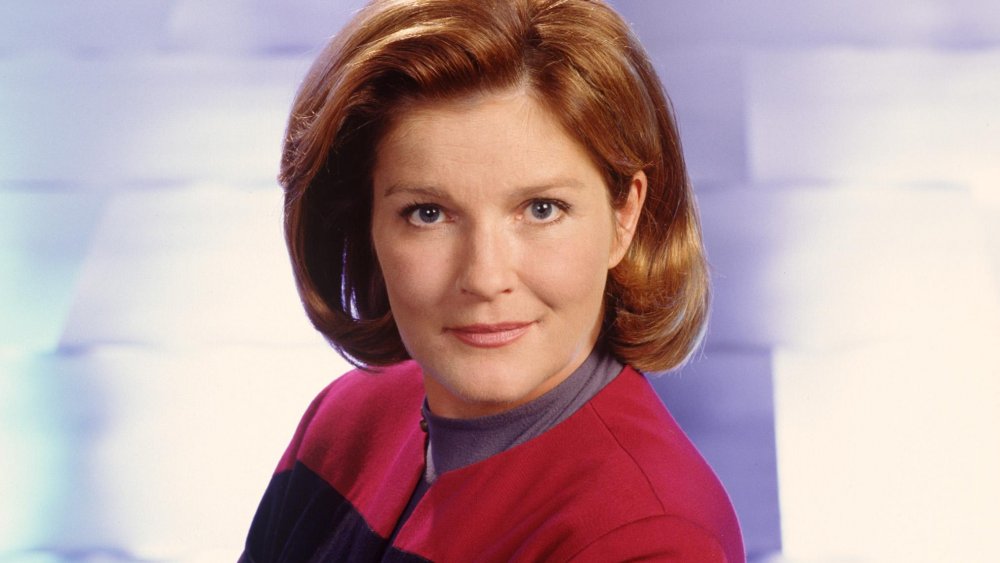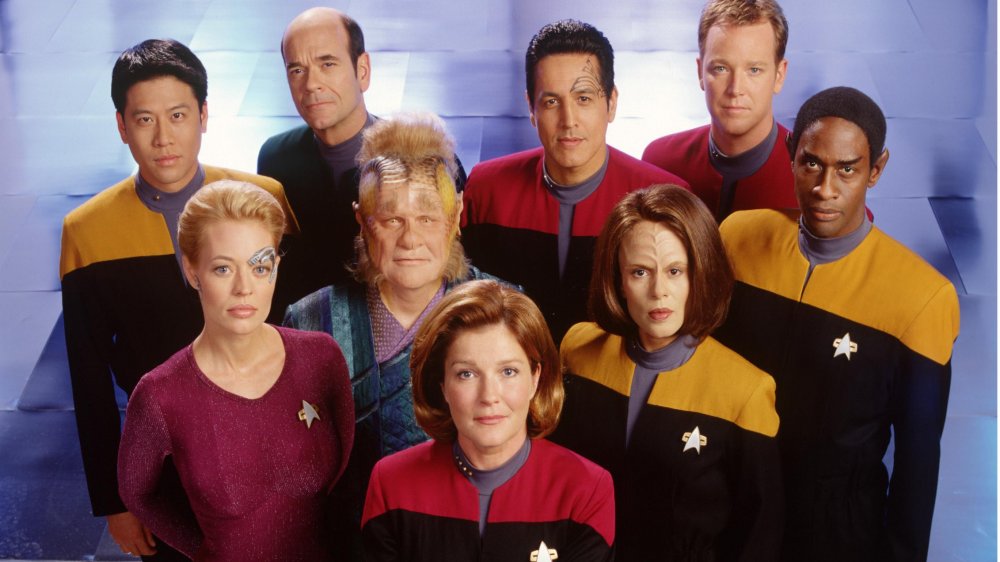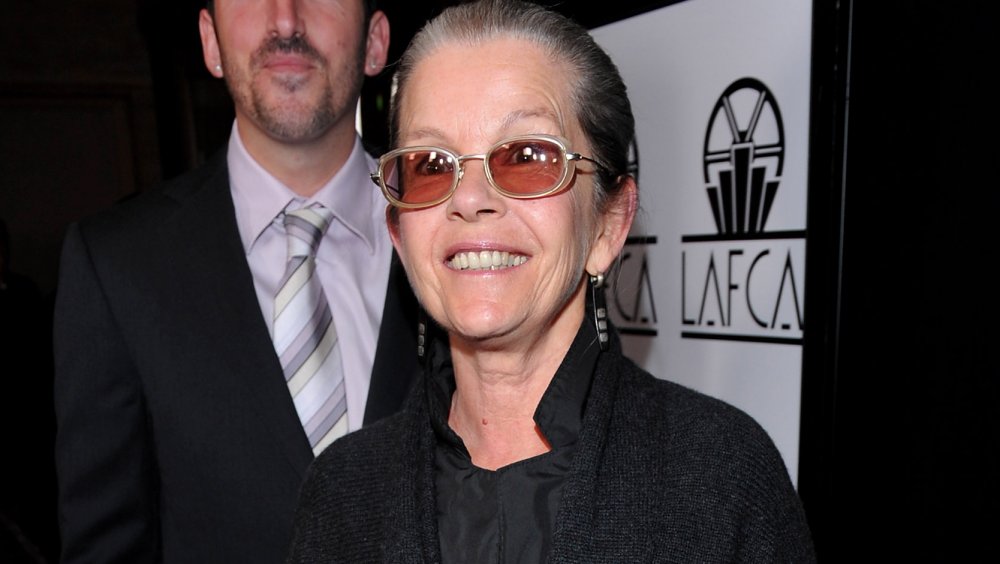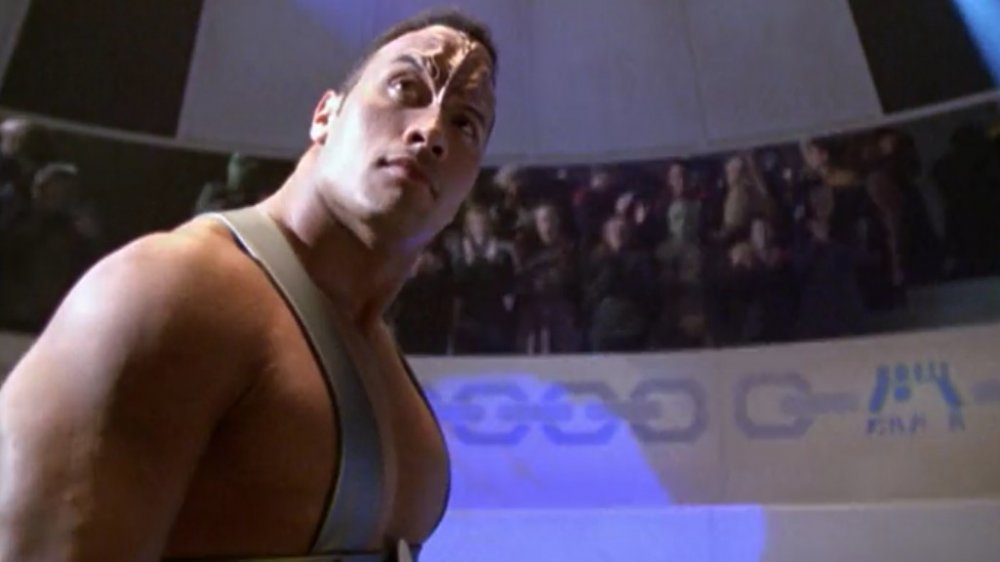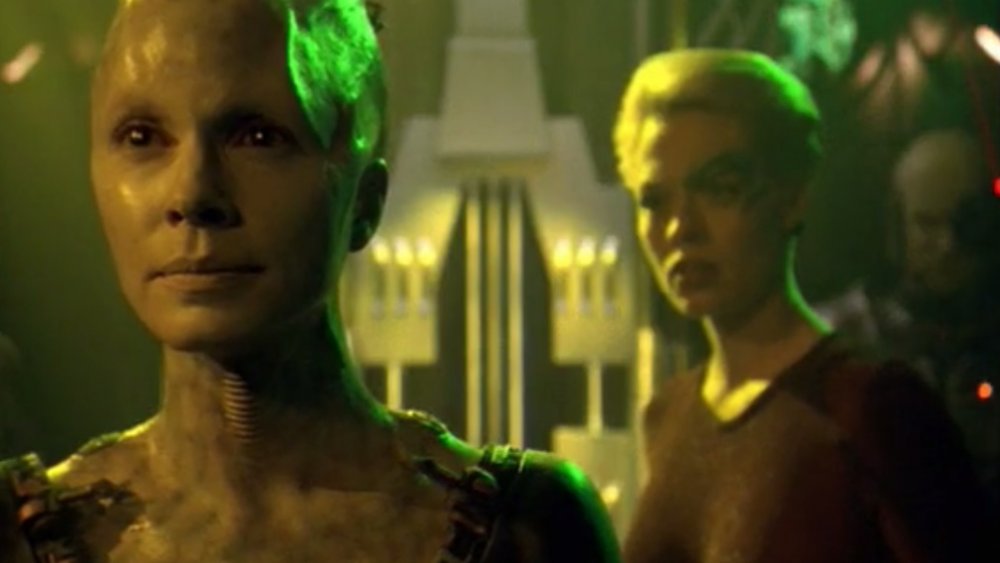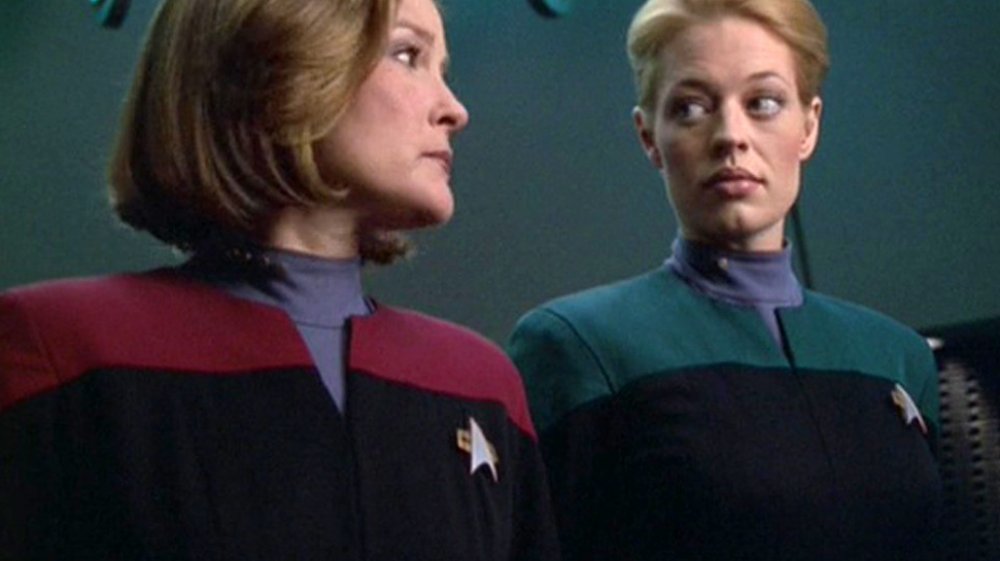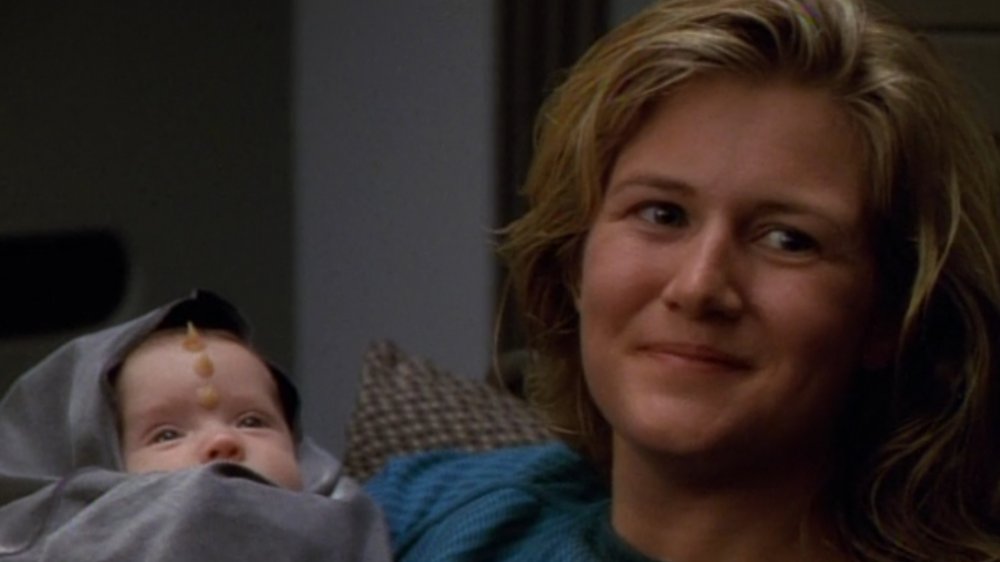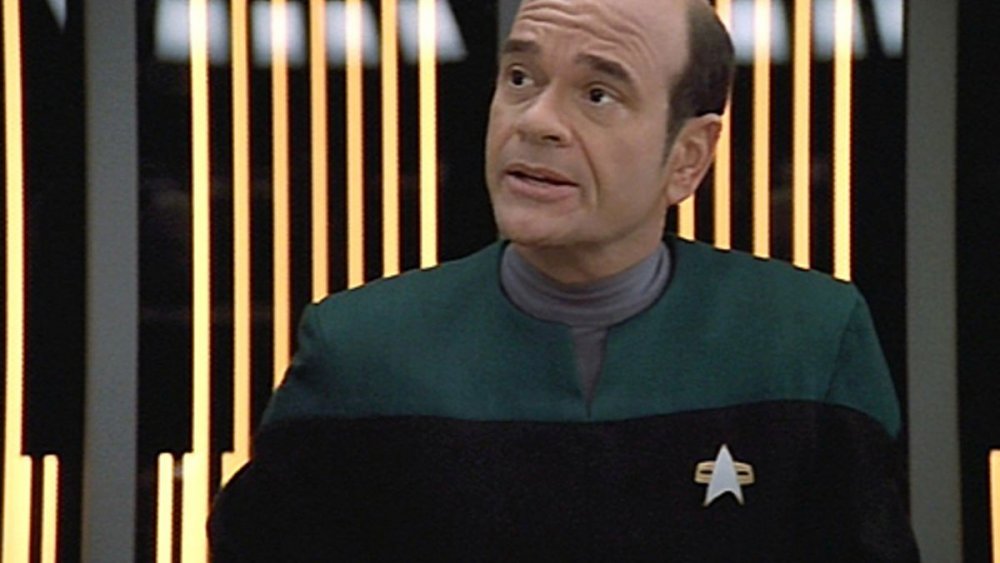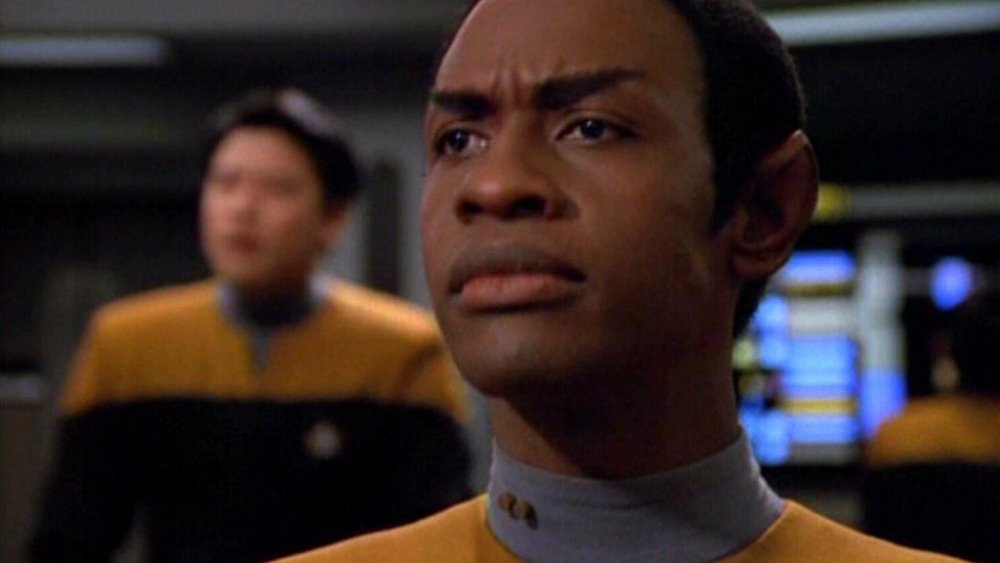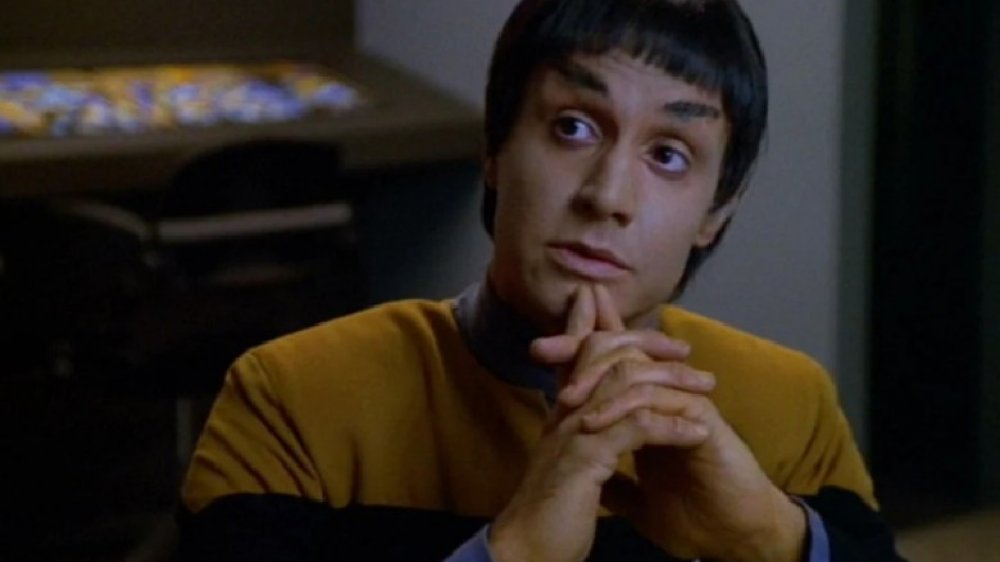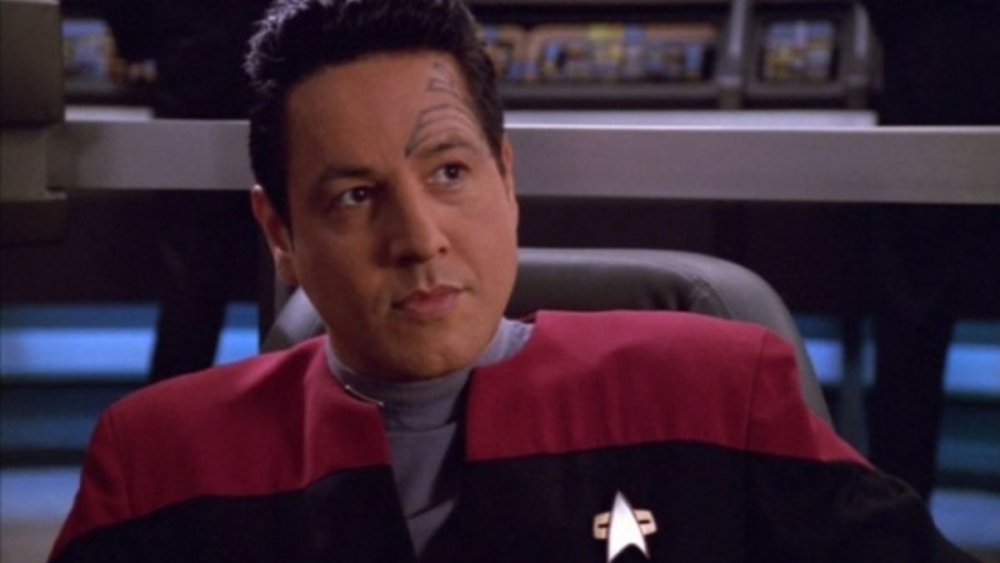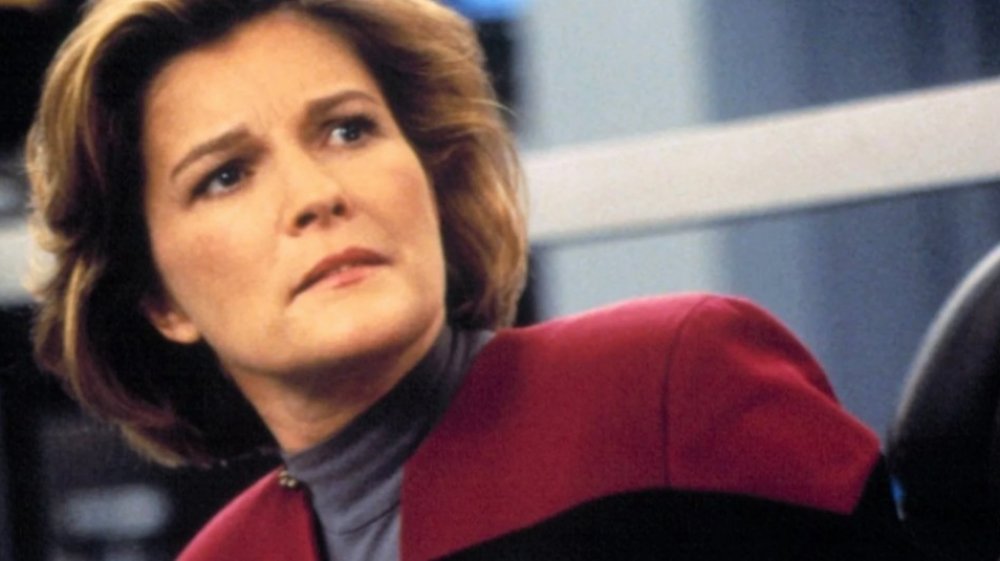The Untold Truth Of Star Trek: Voyager
Part of the problem with exploring the final frontier? There's just so much of it. That's the challenge the crew of the USS Voyager had to contend with in Star Trek: Voyager's two-part premiere "Caretaker," when the ship was tossed so deep into the distant Delta Quadrant that the crew believed it would take them the better part of a century to get home. Cut off from Starfleet and the Federation, Captain Kathryn Janeway (Kate Mulgrew) — the first female captain to lead a Trek series — struggled to get her crew home while at the same time upholding the Federation's values and even using the opportunity to expand their knowledge of unexplored space.
Voyager followed the adventures of its crew for seven seasons until they finally made their way home in the two-part finale "Endgame." And through all the space battles, the romance, and the debates between Voyager's principled officers, there was a lot more going on behind the scenes than you know. Resentments ran high between certain cast members, some characters were created to pay tribute to fallen heroes, and other characters were revealed to have surprising connections to other series. Voyager also helped to launch the blockbuster career of one actor while proving a singular triumph for a young network.
To learn about all these things and more, keep reading for the untold truth of Star Trek: Voyager.
Star Trek: Voyager was the jewel of UPN's crown
Paramount used Star Trek: Voyager to help launch its new mini-network UPN (United Paramount Network) in January 1995. UPN only had a small number of shows when it launched and only aired programming Monday and Tuesday nights between 8 PM and 10 PM. That same month, Voyager was joined by the sitcom Pig Sty, comedian Richard Jeni's Platypus Man, the Richard Grieco-led drama Marker, and the sci-fi/Western series Legend.
Voyager's "Caretaker" was UPN's first telecast on January 16, 1995, and it had 21.3 million viewers tuning in. Of the network's five inaugural series, Voyager was the only program to survive its first year. Yes, believe it or not, even a show with a name like Platypus Man got the ax. Voyager went on to outlive other early UPN series like The Sentinel, the sci-fi drama Nowhere Man, and the hit teen sitcom Moesha. Although, to be fair, its final episode aired only a week after Moesha's. However, Voyager was the only of UPN's early series to last as long as seven seasons.
Kate Mulgrew almost wasn't Janeway
When it came time to cast Janeway, Voyager's casting team looked at a lot of actresses. Among the candidates was Linda Hamilton of the Terminator films, Susan Gibney who'd played the recurring role of Dr. Leah Brahms on Star Trek: The Next Generation (TNG), and the Buck Rogers alum Erin Gray. Of course, as we all know, eventually Kate Mulgrew auditioned for the role, and the part went to ... Canadian actress Geneviève Bujold.
That's right. In her 2015 memoir Born with Teeth, Mulgrew wrote that her first audition for the role went so poorly that she actually apologized for her subpar performance. She explained that she was distracted by having just fallen in love with a man — Tim Hagan, who she married in 1999 — and that she was meeting him later. Instead of Mulgrew, Bujold was cast in the role of the character who was then named Elizabeth Janeway.
However, Bujold didn't last much of the voyage. She quit after a day and a half of filming. Voyager co-creator Rick Berman said of Bujold's departure, "This was a woman who, in no way, was going to be able to deal with the rigors of episodic television." Considering Star Trek documentaries like What We Left Behind and The Captains include cast and crew talking about 16-hour work days, it's tough to blame Bujold too much for leaving the crew to deal with the Delta Quadrant without her.
Star Trek: Voyager helped launch Dwayne Johnson's acting career
Star Trek has helped launch plenty of acting careers, and Voyager gave an early role to someone known today for leading blockbuster action flicks. Dwayne "The Rock" Johnson — still mostly known as a WWF wrestler in those days — made one of his first non-wrestling television appearances in the Voyager season six episode "Tsunkatse."
While the rest of the crew is enjoying shore leave, Tuvok (Tim Russ) and Seven of Nine (Jeri Ryan) take a shuttle to examine a nearby nebula. While out on their own, they're attacked and captured by aliens running a popular fighting arena. Tuvok is badly injured, and the arena's owner uses the injured Vulcan as leverage to make Seven fight for him. Her first opponent is the Rock, who plays an unnamed Pendari champion. In a fun fourth wall-breaking moment, the Rock gives his signature eyebrow raise to the crowd before defeating Seven in the ring.
Speaking to StarTrek.com in 2018, Rick Berman expressed a lot of pride for his part in building the foundation for Johnson's acting career, saying, "It makes me feel terrific ... that there are some actors that we gave a first job to that have become successful. People like Dwayne Johnson, whose first acting job I think was on Voyager, and he's a world-renowned movie star now." Technically, Berman wasn't right about that. Johnson showed up on That '70s Show a year before "Tsunkatse," but we're guessing the appearance on Voyager didn't hurt his resume.
On Netflix, Voyager is the Trek champion
Most Trek fans have their own pick for their favorite Trek series. So if a Trek fan ever tells you "everyone hates this series" or "everyone loves this one," never believe them. For every fan who loves Deep Space Nine, there are plenty who can't stand it. For every Trekkie who wishes Discovery had never been made, there are old school fans and new who love it. So we're not trying to tell you Voyager is the best Star Trek show, but some numbers have revealed something interesting about the series' 21st-century popularity.
In 2017, Netflix reviewed data (via Business Insider) from over 100 million subscribers in close to 200 countries to figure which episodes of Star Trek were watched more than any others. At the time, Netflix carried all the franchise's series produced between Star Trek: The Original Series and the 2005 finale of Star Trek: Enterprise. And during its research, Netflix didn't count first or second episodes of series, because those generally have more views than others.
Voyager and The Next Generation were the only two series with episodes in the top ten most watched, and of those ten episodes, six belong to Voyager. Those six episodes help to prove the enduring popularity of both the Borg and Voyager's season four newcomer, Seven of Nine. Most of the six episodes are very Seven and Borg-centric. They include the series finale "Endgame," the two-parters "Scorpion" and "Dark Frontiers," and "The Gift," which is the episode immediately following Seven's first appearance.
Behind the camera, Janeway and Seven didn't assimilate well
Behind the scenes of Voyager, Mulgrew resented the addition of Seven of Nine, whose sex appeal helped to boost Voyager's ratings. And on 2013's Girl on Guy podcast (via TrekCore), Ryan talked about feeling physically ill at the thought of doing scenes with a particular Voyager co-star. She didn't name Mulgrew, but she mentioned details making it clear it could be no one other than the lead actress.
While researching his book The Fifty-Year Mission, co-writer Ed Gross looked into the feud and got more answers than he expected. One unnamed cast member claimed Mulgrew tried to enforce a rule that Ryan wouldn't be allowed to use the bathroom during work because it took "too much time" to get her in and out of costume. Harry Kim actor Garrett Wang said Mulgrew's anger wasn't initially directed toward Ryan, but once it was, "it became horrible." Chakotay actor Robert Beltran told Gross, "If ... it was me being insulted and Kate was a man, I probably would have taken a swipe at the guy."
To her credit, the Voyager captain owned up her behavior toward Ryan. Mulgrew told Gross, "This is on me, not Jeri [Ryan]. ... I'd hoped against hope that Janeway would be sufficient. That we didn't have to bring a beautiful, sexy girl in." She went on to say she regretted her treatment of Ryan. "I probably should have comported myself better. I should have been more philosophical about it, but in the moment, it was difficult."
Ensign Wildman paid tribute to a young hero
One of the more prominent recurring characters on Voyager was Ensign Samantha Wildman (Nancy Hower). Voyager's unexpected journey to the Delta Quadrant separated the pregnant Ensign Wildman from her husband by about 70,000 light years. But on the bright side, her half-alien daughter, Naomi, eventually turned into another favorite recurring figure on Voyager, becoming close friends with Neelix (Ethan Phillips) and even the usually socially resistant Seven of Nine.
Interestingly, Samantha Wildman's name has a special meaning. Wildman first appeared in the second season episode "Elogium," co-written by Jimmy Diggs. The same year he sold the script, Diggs' wife almost died. A kidney transplant saved her life, and Diggs learned the donor was a seven-year-old girl. He wrote a letter to Voyager's producers, asking them to name the episode's new character "Samantha" after the little girl whose kidney saved his wife. "The ancient Greeks believed the gods would reward heroic mortals by placing them in the stars," Diggs wrote. "By honoring the memory of this child, the producers of Star Trek will accomplish the same thing." Because the young girl adored animals, Ensign Wildman was not only given her name but made part of the ship's xenobiology department.
The Doctor channeled Bones without knowing it
One of the more popular characters on Voyager was also its best source of comic relief — the Doctor played by Robert Picardo. The Doctor is an Emergency Medical Hologram meant only for short-term use, but his job gets much more involved when Voyager's human doctor dies after the ship is thrown into the Delta Quadrant. Often cranky and arrogant, the Doctor also told some powerful stories in his attempts to be recognized as deserving equal rights with the rest of the crew.
Speaking to StarTrek.com in January 2020, Picardo said he used a unique tactic in his audition for the role of the Doctor without even knowing he was using it. After reading the last scripted line, "I believe someone has failed to terminate my program," Picardo improvised with, "I'm a doctor, not a nightlight." Picardo said the line "got a big laugh, and [he] was hired the next day."
Of course, what makes the ad-libbed line funny is the play on Dr. McCoy's (DeForest Kelley) penchant for saying, "I'm a doctor, not a _____." But apparently, Picardo had no idea about Kelley's famous catchphrase. He said, "I faked my way through the audition and ad-libbed a DeForest Kelley joke without knowing it was a DeForest Kelley joke." Apparently, the gods of cranky Star Trek physicians were with him that day.
Tuvok came close to being a TNG regular
Tim Russ actually had a few Trek one-off gigs before landing the role of Security Chief Tuvok on Voyager. On DS9, he was a Klingon mercenary who helps take the station hostage in "Invasive Procedures," and in TNG's "Starship Mine," he's one of a group of criminals trying to steal trilithium resin from the Enterprise. In 1994's Star Trek: Generations, Russ plays a lieutenant on the bridge of the Enterprise-B in the film's opening.
But before he did any of that work, he auditioned for the part of Geordi La Forge on TNG. Speaking to TrekMovie.com in 2018, Russ said he was ultimately relieved to have lost the Geordi role to Levar Burton. Why? The dialogue. "The role [of Tuvok] was somewhat more organic and much easier in terms of dialogue," Russ said. "I am glad I didn't get stuck with all that engineering tech talk. ... That kind of dialogue doesn't do anything for me."
Russ also had the distinction of getting to appear in one of the few episodes in which Voyager characters could cross over into other series. Tuvok shows up in the DS9 season three episode "Through the Looking Glass," though it's not quite the same Tuvok. The episode takes place in the mirror universe first made famous by Star Trek: The Original Series' "Mirror, Mirror." That universe's version of Tuvok appears as a member of the Terran resistance fighting against the Klingon-Cardassian Alliance.
Vorik may have a brother on the Enterprise
One of Voyager's recurring characters was Ensign Vorik, played by Alexander Enberg. Vorik is a Vulcan engineer who often worked closely with B'Elanna Torres (Roxann Dawson). And Vorik developed a romantic interest in B'Elanna with violent consequences. In perhaps Vorik's most memorable appearance — in season three's "Blood Fever" — Vorik experiences the Vulcan mating period of pon farr and chooses B'Elanna as his mate. He forms a telepathic connection with B'Elanna, causing her violent Klingon mating instincts to emerge. The situation ends in a duel between B'Elanna and Vorik, which both thankfully survive.
Between 1997 and 2001, Enberg appears in nine episodes of Voyager as Vorik, but it wasn't the first time he appeared in a Trek show or even the first time he appeared as a Vulcan. Enberg was cast as a Vulcan named Taurik in "The Lower Decks," an episode in the middle of TNG's final season focusing on the rank and file aboard the Enterprise.
With Enberg not only playing Vulcans on both shows but with both Vulcans sharing rhyming names, some fans have wondered if there could be a connection between Vorik and Taurik. According to Voyager co-creator Jeri Taylor — who also happens to be Enberg's mother — there could be. In the 2012 book Star Trek: The Next Generation 365, Taylor implies Taurik and Vorik may very well be twin brothers. And since she's their mother, we guess she would know.
Chakotay spoke his mind both on and off Star Trek: Voyager
As Voyager's first officer, Commander Chakotay is often forced to tell Captain Janeway things she doesn't want to hear. Fittingly, actor Robert Beltran is known for speaking his mind on what he likes and doesn't like about Voyager, regardless of the consequences, even when the show was still on the air. By 2000, Beltran had aired enough dirty laundry in public that producer Kenneth Biller told SFX Magazine (via TrekToday) that he thought the actor "should stop whining and do his job."
Speaking to StarTrek.com in 2012, Beltran talked about not feeling fulfilled on Voyager. "You're doing the same thing every week, with a new variation," the actor said, later adding, "I didn't like some of the things that were going towards the last three years, and I risked being fired because I wasn't happy creatively." According to Beltran, Chakotay didn't have a lot of interesting relationships after the departure of Seska (Martha Hackett), his former lover who's eventually revealed to be a Cardassian. "After Seska left, it was only that relationship with the captain that had depth to it. ... Chakotay and the other characters, there wasn't much of a relationship there."
And Beltran has one problem with Trek a lot of fans may consider downright sacrilegious. Beltran hates the Prime Directive. In 2016, he told CNET, "The idea of leaving any species to die in its own filth when you have the ability to help them ... it's a bunch of fascist crap."
All these years after Star Trek: Voyager, Janeway is still making an impact
Decades after Captain Janeway was sent to the Delta Quadrant with the rest of Voyager's crew, it can be easy to forget how big of a deal it was in 1995 for a woman to be leading a Star Trek series as its ship's captain. While there's sadly still resistance to the idea, we're getting used to female-led action films and series, including Star Wars epics and superhero blockbusters. But in the mid-90's, for a woman to not only be the lead in a science fiction adventure series but playing a character regularly giving men orders, it was a big deal. Mulgrew left an important mark on our culture, and it's felt far beyond the world of television.
Speaking to TrekMovie in 2019 about the 25th anniversary of Voyager, Mulgrew was asked about highly visible female politicians like Stacey Abrams and Alexandria Ocasio-Cortez who'd named Captain Janeway as an early influence. Mulgrew said she made a surprise appearance at one of Ocasio-Cortez's rallies, and that when they announced Mulgrew, "[Ocasio-Cortez] gasped, she turned. And when I approached her, I think she kind of fell." Mulgrew said Ocasio-Cortez related stories of watching Voyager as a child and that "when they lost their screen — they had bad reception in their house, and often the television was just black and white — she'd listen to it, like a radio show."
